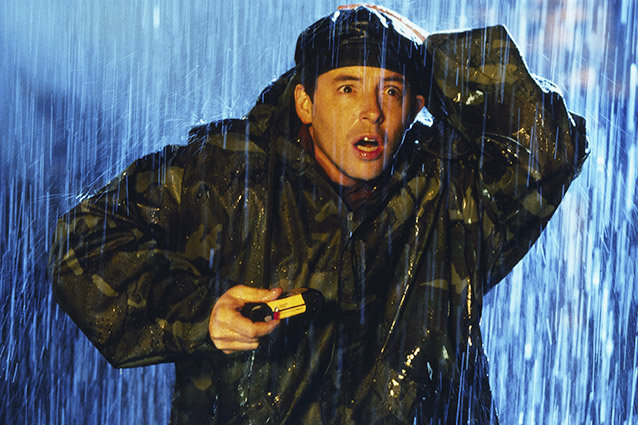
The 1998 version of Godzilla had so much promise before dollars, indecision and lack of respect ruined it. It could have been a monstrous smash at the box office, one that Hollywood would remember and perhaps build a franchise around. The unstoppable repitlian star of countless Japanese movies would finally get a terrific American treatment. But we all know what happened instead.
TriStar Pictures acquired the rights to the monster in the early 1990s, immediately attaching serious talent to develop the film. Ted Elliot and Terry Rossio, the writing team behind Aladdin and, later, Shrek and Pirates of the Caribbean, penned a strong script in which Godzilla was a misunderstood beast who would later save humanity by defeating a threatening monster called the Gryphon. You can read the script here.
This version would have pleased hardcore Godzilla fans and average moviegoers alike. In fact, TriStar wanted Godzilla’s most famous villain, Ghidrah, to battle Big G in this film. Toho, the Japanese company which held the rights to Godzilla and all of the monsters in that universe, wanted more money for the use of Ghidrah. Here is Ghidrah in action throughout the years:
The issue of money is why the film went south. Jan de Bont, director of Speed and later Twister, was attached to direct Godzilla. But the budget swelled up too much (around $130 million, a lot for the 1990s but not that much today) and the film veered off in a totally different direction.
Independence Day Invades Godzilla
With the budget an issue, the creators of Independence Day came in and promised that they could deliver a movie way under that proposed dollar figure. Dean Devlin and Roland Emmerich ditched the original script and basically did what they wanted. But they didn’t respect the mythology of Godzilla and rushed a script out in the same way a kindergartener colors a random worksheet.
“Dean Devlin and Roland Emmerich, I’d argue, screwed it up,” Rossio wrote on wordplayer.com. “Godzilla became a mom who wanted to go lay eggs in New York City. And when military guys fired guns at him, Godzilla would… I can’t believe it even as I type it… Godzilla would actually squeal, turn, run and hide.”
Devlin and Emmerich had tremendous success with ID4, but Rossio’s observation about Godzilla was 100 percent right. Godzilla fans and critics wouldn’t approve of this version.
The Fallout
The 1998 Godzilla was so unacceptable that fans gave him this nickname: G.I.N.O. (Godzilla In Name Only). Godzilla had always been played by a guy in a rubber suit; now with all the American special effects and hype, it somehow became a subpar product. Kenpachiro Satsuma, a veteran Godzilla actor, walked out of the Japanese premiere and said, “It’s not Godzilla. It doesn’t have his spirit.” Maybe Matthew Broderick was the wrong choice to star in the movie. What about the rest of the cast? A bunch of voice actors from The Simpsons and other no names? Only Jean Reno (The Professional) seemed to fit the bill, but even he could have been tougher.
In the end, Godzilla still had a budget of $130 million. The worldwide box office took more than $379 million, which was good, but not franchise good. Not sequel good. Godzilla was no longer a larger-than-life monster in the ’98 version. His death by 12 high-powered missiles would have never killed a normal Godzilla. Missiles like that would have simply annoyed the monster. The potential of the version featuring the Elliot-Rossio script with de Bont at the helm could have meant there would be no need for the Gareth Edwards incarnation. Perhaps a franchise would have been possible in the same way we have Marvel Comics, Fast & The Furious and James Bond movies. For your viewing pleasure, here is the death of 1998’s Godzilla. May we never see such disrespect for source material again.


